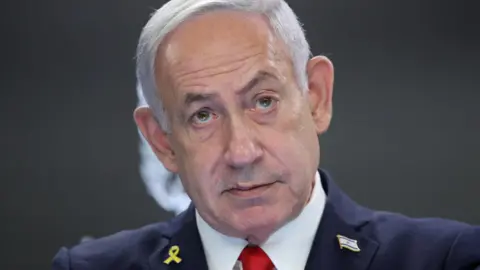In recent developments within international diplomacy, Israeli Prime Minister Benjamin Netanyahu has expressed strong criticism towards Australian Prime Minister Anthony Albanese, accusing him of “betraying Israel” and showing disregard for Australia’s Jewish community. This contentious exchange follows a series of diplomatic tensions that have arisen between Australia and Israel, particularly through events surrounding the visit of far-right Israeli politician Simcha Rothman.
Netanyahu’s severe remarks were made public on a Tuesday, during which he also labeled Albanese as a “weak politician,” a comment reflecting the escalating tensions in their bilateral relationship. The friction peaked after Australia rejected Rothman’s visa application—an order issued in light of a broader diplomatic strategy aimed at curbing elements deemed hate-inclined or divisive. Rothman’s planned visit was supposed to feature discussions organized by the Australian Jewish Association, contributing to the complexities of this diplomatic spat.
The backdrop of these tensions is set against Australia’s recent announcement that it will officially recognize a Palestinian state starting in September. This declaration was met with reciprocal action from Israel, which involved the suspension of Australian visas for their representatives to the Palestinian Authority. This retaliatory measure has been described by Israeli officials as a response to the perceived affront on Israel’s diplomatic stance.
Amid these unfolding events, Prime Minister Albanese has yet to respond directly to Netanyahu’s provocative claims. However, the Australian political landscape’s reaction has been notably critical of Netanyahu. Yair Lapid, opposing leader in Israel, has referred to Netanyahu’s remarks as a “gift” to Albanese, arguing that facing Netanyahu is an asset for leaders in the democratic world today. Notably, Lapid articulated on social media that Netanyahu’s confrontational statements were politically unwise, suggesting they significantly bolster Albanese’s standing in Australia.
The tensions intensified further when Australian Home Affairs Minister Tony Burke reaffirmed the government’s position against allowing individuals who spread hate and division into the country. Burke emphasized that Australia stands firm against figures who promote such divisive narratives, aligning with a broader commitment to combat antisemitism in light of recent increases in antisemitic incidents across the nation. His statements came mere hours after Rothman’s visa was deemed inappropriate, setting off further dialogue on the implications of such policies.
In a pointed reaction, Gideon Sa’ar, Israel’s Foreign Affairs Minister, underscored that official Australian visa requests for entry into Israel would face rigorous scrutiny. He accused the Australian government of exacerbating the climate of antisemitism while condemning Australia’s stance in light of escalating tensions related to the ongoing Israel-Hamas conflict.
These diplomatic exchanges have highlighted a crucial juncture in Australia-Israel relations, particularly regarding Australia’s pledge to recognize Palestinian sovereignty. Albanese previously characterized Netanyahu’s actions during the latest conflict in Gaza as detached from the humanitarian crises affecting innocents. His sentiment was echoed by leaders from other nations, including the UK and Canada, all of whom face similar criticisms from Netanyahu.
The Israeli Prime Minister has drawn sharp lines between Australia’s supportive measures for Palestinian statehood and what he perceives as support for violence against Israelis. As a result, Netanyahu has launched broad condemnations toward leaders who challenge Israel, indicating a rigid stance that continues to strain diplomatic ties.
Despite the severe rhetoric exchanged, the international community awaits further responses from both leaders, particularly as Australia engages more deeply with Palestinian state recognition, further influencing the delicate political tapestry of the Middle East. The state of Palestine is currently acknowledged by 147 out of 193 UN member states, which underscores the complexity and global ramifications of these diplomatic disputes.
Overall, these interactions serve as a reminder of the intersection of domestic policies and international relations, showcasing how leaders navigate volatile global politics while also addressing internal community sentiments. The developments have set the stage for potentially significant shifts in how nations approach the Israeli-Palestinian conflict and the broader implications for international diplomacy.












